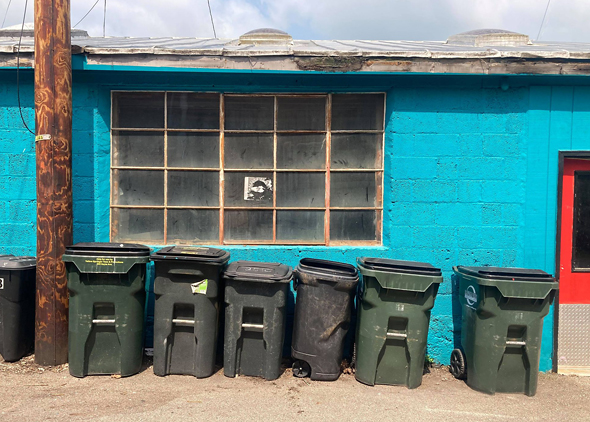
Down to Earth — Recycling confusion
- Published: July 25, 2021
By Victoria Hennessy
The throwaway plastic that holds our takeout food and wraps our dry cleaning is widely seen as one of the world’s biggest environmental hazards. It pollutes as it is produced, through the extraction of fossil fuels, and no sooner than it is used, it pollutes again. It ends up in landfills, leaking toxins into the soil. It clogs waterways and chokes marine animals. It is burned, sending hazardous fumes into the air.
Over 130 million tons of single-use plastics are produced per year. According to a report released from Australia, 20 companies, including U.S. companies ExxonMobil and Dow, make most of it. While production is growing, recycling is minimal, with as little as 8% of plastics being recycled. Advocacy efforts to persuade consumers to use less plastic have failed to gain traction.
Until stricter environmental regulations are put in place, the best we can do is to relearn how to recycle correctly. When recycling first hit the scene in the ’70s and ’80s, people spent time sorting recyclables, washing glass bottles, removing labels and ensuring their bins were free of food waste. Once China became the destination for our recyclables, global recycling shifted from multi-stream to single-stream, allowing people to put all of their recyclables into one container. Contamination was of little consideration, and often exceeded over 25%. So, in 2018, when China abruptly banned plastic imports of anything with more than 0.5% contamination, essentially, China stopped accepting our poor recycling habits.
To make matters worse, in America, recycling is a regional enterprise. Each city has different rules, based on available markets for various recyclables, determined by their material recovery facility, or MRF. Even cities using the same MRF might have different rules. There are no absolute answers for what can be recycled, making recycling even more difficult. Contact your waste collector often and obtain a current list of what is acceptable to recycle in your curbside bins.
When you travel away from home, or when tourists visit Yellow Springs, there may be confusion at the recycling receptacle: “Is it trash, or is it recyclable?” The safest rule to follow is: “When in doubt, throw it out!” This is very difficult for some who have recycled for years and are devoted to keeping items out of the landfill. But it is better to follow this rule than to place an inappropriate item in the recycling bin and contaminate the entire load.
Even as we increase our reducing and reusing habits, we can’t avoid recycling, so we should try to do it right. Here are a few general guidelines to keep in mind:
• No plastic bags of any type go into the recycling bin — even if the bag is labeled as recyclable. Plastic bags are the number one contaminant in recycling loads. Plastic bags act as “tanglers,” getting caught in machinery and shutting down equipment. To recycle plastic bags, you must go to a drop-off area designated for plastic bags. This also means you shouldn’t bag your recyclables. Instead, dump them loosely into your bin. Anything that passes the “poke test” — where plastics are soft enough to push your finger through — are prime candidates for commercial drop-off areas. The nearest Kroger will accept all of these, including zip-lock bags, bubble wrap, stretch wrap, plastic overwrap, cereal box liners, plastic shipping envelopes, and more. For a complete list, go to kroger.com/home-tips/cleaning/be-a-zero-hero. Tom’s Market also has a drop-off bin for plastic bags.
• Small things are big problems — don’t recycle anything smaller than a credit card. That includes straws, loose bottle caps, coffee pods, plastic cutlery, paperclips, and a million other things that creep into our daily lives. These objects are too small to be sorted and can jam the recycling machinery. Plastic bottle caps may be left on plastic bottles, even if made of different plastic types. Metal caps, however, should be thrown in the trash.
• Clean, empty and dry. Food waste is the worst for recycling. It contaminates whole loads of recyclable material, fast-tracking them to landfills. All items must be thoroughly rinsed with no visible food or liquid residue. Laundry detergent bottles just need a single rinse and caps replaced, or simply switch to laundry detergent pods or sheets.
• Stop aspirational recycling. When we do this — optimistically putting non-recyclable items, such as Styrofoam, in recycling bins — we contaminate whole loads of otherwise recyclable materials. Keep in mind that only items made from one material can be recycled. Items like plastic-coated coffee cups, laminated paper and paper-bubble wrap envelopes are trash. Rigid plastics are theoretically recyclable, labeled by resin codes #1 through #7. Currently, only #1 and #2 plastic bottles with the top smaller than the base are acceptable in Yellow Springs. Just recently, #5 plastics in the form of tubs — margarine, cottage cheese, sour cream, whipped cream, etc., including yogurt or fruit cups — are accepted by Rumpke. Cartons can be recycled, with straws and lids removed. Clamshells or any plastic that can tear like paper, such as cracker bags, box liners and chip bags cannot be recycled. Kroger accepts cereal bags.
We live in a finite world with finite space. Reduce your consumption of plastic products and packaging. Repair items that break. Reuse items in new ways. These practices will keep your recycling to a minimum. But when you do recycle, do it right. Go to rumpke.com for the most up-to-date information for Yellow Springs.
*The author is a biologist and former president of the Green Environmental Commission. She has written columns on recycling for the News in the past and has been working on improving recycling in the village for several years.
The Yellow Springs News encourages respectful discussion of this article.
You must login to post a comment.
Don't have a login? Register for a free YSNews.com account.












No comments yet for this article.